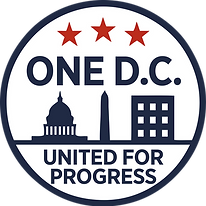
TRACEY L. LUCAS FOR D.C. MAYOR
CAMPAIGN PLATFORM 5
Equitable Medical Marijuana Dispensaries in Washington DC
Tracey Lucas envisions a fair and inclusive cannabis industry in Washington, DC, prioritizing economic opportunities for residents disproportionately impacted by the War on Drugs. Drawing on successful models like Oakland, California’s Cannabis Equity Program, this initiative will ensure that DC residents who have been incarcerated for marijuana-related offenses have the opportunity to own and operate dispensaries, building generational wealth and revitalizing their communities.
Key Components of the Plan
1.
Reserve 75% of new medical marijuana dispensary licenses for DC residents with past convictions related to marijuana sales or distribution or their immediate family members.
-
Inspiration from Oakland: Oakland’s Equity Program has successfully allocated over 60% of cannabis business licenses to equity applicants.
-
Streamlined Process: Simplify licensing with reduced fees, expedited review timelines, and tailored technical assistance.
2.
Startup Grants and Loans: Allocate $15 million annually to provide financial support for equity applicants to cover startup costs, including rent, inventory, licensing fees, and workforce development.
-
Modeled After Success: Like Oakland’s Cannabis Equity Grant Program, equity applicants in DC will have access to grants (up to $100,000 per applicant) and low-interest loans to lower barriers to entry.
3.
Community Investment Fund: Require all dispensaries owned through the equity program to reinvest 2% of their annual revenue into local communities for:
-
Affordable housing initiatives
-
Job training programs
-
Youth development projects
4.
Incubator Partnerships: Pair equity applicants with established cannabis businesses through a business incubator model.
-
How It Works: General applicants who provide free rent, equipment, or mentorship to equity businesses will receive expedited licensing as an incentive.
-
Oakland’s Impact: This partnership model has been instrumental in reducing startup costs for equity applicants.
5.
Technical Assistance and Workforce Training: Partner with local universities, nonprofits, and industry leaders to provide free training on:
-
Business planning and management
-
Compliance with DC regulations
-
Marketing and customer service
-
Workforce development for residents of impacted neighborhoods
6.
Tax Incentives for Equity Businesses: Offer tax breaks to equity dispensaries during their first five years of operation, encouraging long-term sustainability and growth.
Cost Breakdown
Total Annual Budget: $15 Million
-
$10 Million – Grants and Loans for Equity Applicants
-
$3 Million – Technical Assistance, Training, and Administrative Costs
-
$2 Million – Community Investment Fund Oversight
Inspiration and Proven Success – Oakland, CA
Oakland’s Cannabis Equity Program demonstrates the transformative potential of similar initiatives:
-
Over 60% of cannabis business licenses were issued to equity applicants.
-
Equity businesses contributed to local economic growth, job creation, and community reinvestment.
-
Adjustments to the program addressed challenges like limited access to capital, ensuring sustained success.
Washington, DC can build on these lessons, tailoring the model to address the unique needs of its residents.
Projected Outcomes in Washington, DC
-
Business Ownership: Create at least 24 equity-owned dispensaries within three years.
-
Job Creation: Generate 1,000+ new jobs in the cannabis sector, prioritizing employment for DC residents in historically disadvantaged neighborhoods.
-
Community Reinvestment: Infuse $5 million annually into local community programs by year five through dispensary contributions.
-
Economic Empowerment: Provide pathways to economic stability and generational wealth for those most affected by past marijuana policies.
Tracey Lucas’s Commitment
Tracey Lucas is dedicated to building a cannabis industry that reflects the values of equity, opportunity, and justice. By reserving 75% of new licenses for equity applicants and implementing a robust support system, this initiative will empower individuals, uplift communities, and ensure the economic benefits of cannabis legalization are shared fairly across Washington, DC.